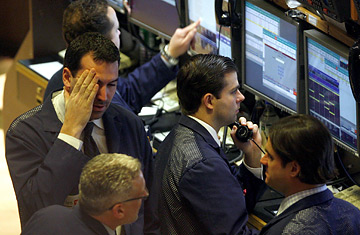
Traders work on the floor of the New York Stock Exchange
Correction Appended: January 25, 2008
Say what you will about today's global economy, it ain't dull. In a cascade of worry on a single trading day, Jan. 21, Hong Kong's Hang Seng index plunged 8.6%, Tokyo's Nikkei 5.7% and Mumbai's Sensex 12.9%. It was a worldwide mini-meltdown, and the Federal Reserve Board wasn't about to let that go unanswered. Before the U.S. markets had even opened, Fed Chairman Ben Bernanke — not a man known for dramatic gestures — slashed a key interest rate three-quarters of a percentage point. The surprise move arrested the rout, and the markets have since rallied, but investors are left to absorb an unavoidable truth: the U.S., still the world's biggest market for exports, appears to be in real economic trouble.
With many of the world's economic movers, shakers and interpreters gathering in the Swiss mountain resort of Davos just as markets from Mumbai to Madrid were freaking out, there was no shortage of explanations as to why. The short answer: U.S. consumers, who have been increasing their spending without pause since all the way back in 1991, are tapped out. They Scrooged their way through the holidays — retail sales were the weakest in five years — and employers started to get nervous. They've dialed down their hiring, sending unemployment inching up 0.3% in December. It might not sound like much, but that's 474,000 fewer people on the payrolls than the previous month — enough for the financial system that enabled this spending binge to take notice and begin the painful return to sobriety.
And so amid all the market gyrations, one economic reality now seems unshakable: if it hasn't arrived already, a recession isn't far away. "The debate is not whether we're going to have a soft landing or a hard landing in the U.S. but how hard the landing is going to be," says Nouriel Roubini, professor of economics at New York University. He sees a sharp, possibly year-long U.S. recession and a global slowdown. Despite Asia's torrid growth, consumers in China and India accounted for only $1.6 trillion of the world's spending last year, a tiny fraction of the $9.5 trillion spent by Americans, according to Stephen Roach, head of Morgan Stanley's business in Asia. It's impossible to pull U.S. spending back without sending ripples through the rest of the world.
So what happens now? Among economists, investors and policymakers, there's little consensus about how long this recession is going to last, or how the U.S. and the world will react to that bitter medicine. What has become evident is that globalization can't insulate us from recessions. The question is whether an increasingly integrated global economy can help soften the pain we're likely to feel at home — or will make the pain worse.
Whatever kind of correction the U.S. is headed for, policymakers don't want it to happen all at once. The Fed's rate cuts and the roughly $145 billion stimulus plan currently being mooted by the White House and Congress are all about pumping enough demand into the economy to make the journey downhill smooth and gradual. Consumer spending used to make up about 67% of all the economic activity in the U.S., but over the past few years, it's ratcheted up to around 72%. "If we take the 5 percentage points out this year, it will be the mother of all U.S. recessions," Roach says. But putting the adjustment off indefinitely isn't a great idea either. "It's just pushing the fundamental problem down the road," says Columbia University economist and Nobel laureate Joseph Stiglitz. "The problem with the U.S. is excessive consumption."
The U.S. consumer binge has been fueled not by rising incomes but by rising debt, especially mortgage debt. "People can't spend 200% of their income on mortgages," says Stiglitz. The only way for this to continue was for house prices to keep rising. Then, shock of shocks, they stopped going up, and mortgages started going bad by the millions.
The repercussions continue to spread through the financial system. It's certainly the worst in home loans, but the troubles in mortgage markets have caused investors to look at other securities a little more skeptically. There's no telling exactly what set off the sell-off in global stock markets, but a possible candidate was the Jan. 18 downgrading by Fitch Ratings of U.S. bond insurer Ambac. The insurer allows cities and other bond issuers to pay lower interest rates because their insured bonds are deemed virtually risk free. But now markets are beginning to question whether Ambac and other bond insurers are really solid enough to confer that kind of distinction. These companies are not so big that the world's economies depend on them, but they play a crucial role in keeping the interconnected gears of global finance turning smoothly.
